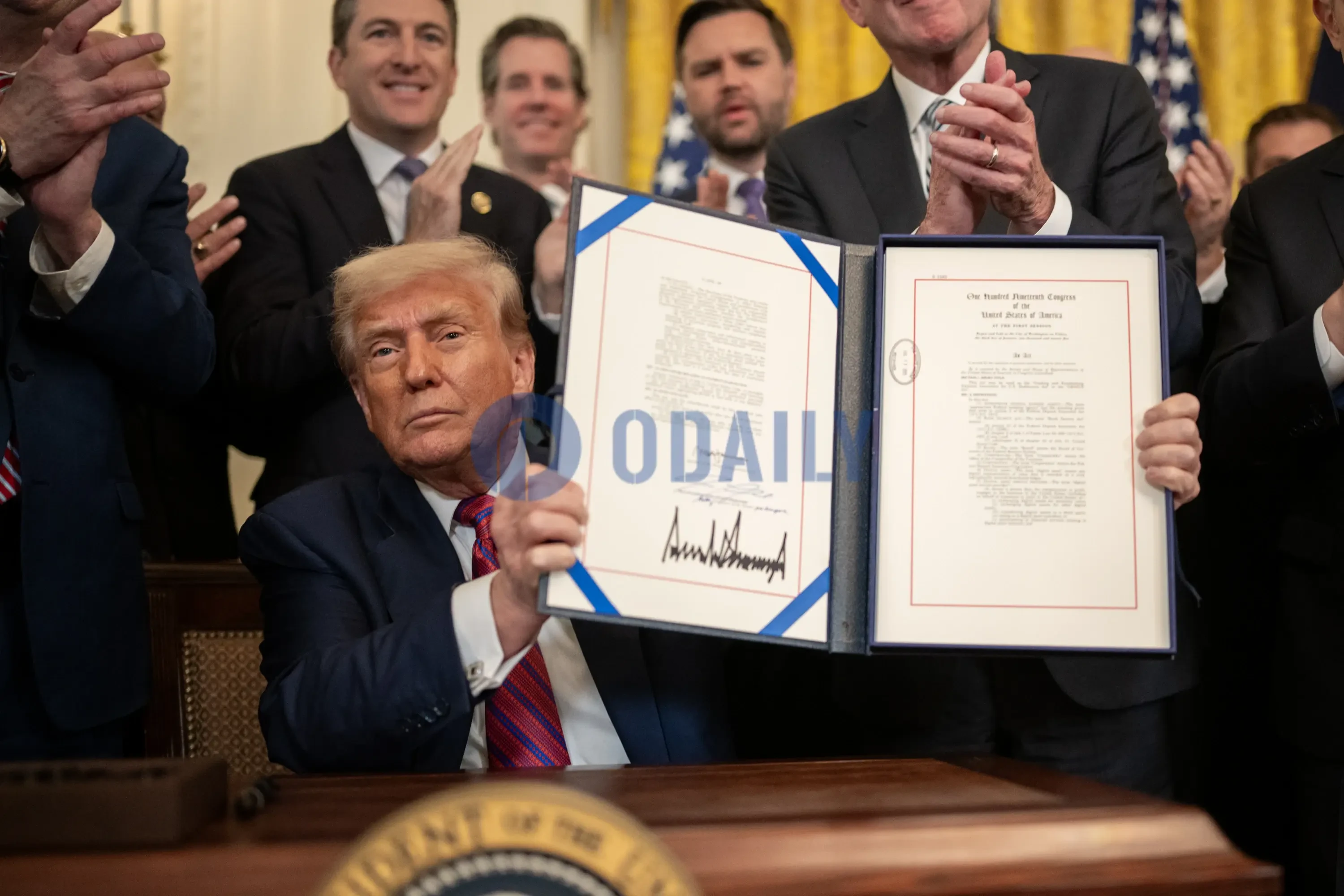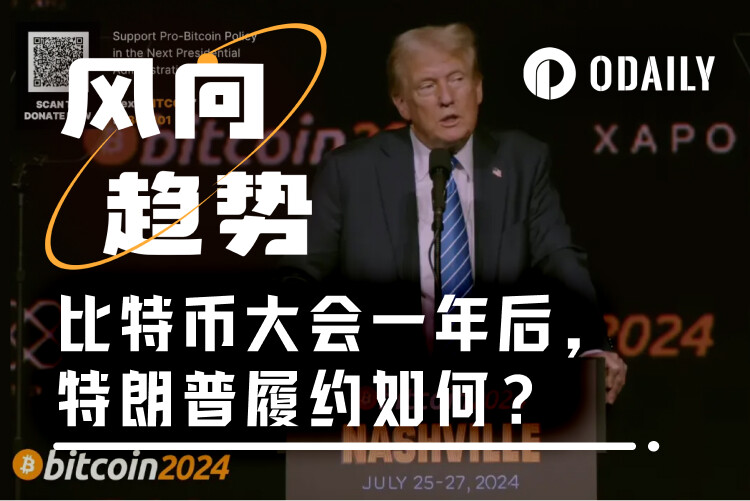Original|Odaily Planet Daily (@OdailyChina)
In July 2024, Trump delivered an impassioned speech at the Bitcoin conference in Nashville, Tennessee, outlining his "Crypto Policy 2.0" plan after taking office. Following this, the crypto community, which makes up about one-fifth of the U.S. population, gradually shifted to support Trump, thereby establishing a significant advantage for him in last November's presidential campaign. A year later, today, more than six months after Trump took office, it may be time to review the "implementation content and progress of crypto policies" since his inauguration to see if he has truly fulfilled his previous promises, providing insight into the future trends of U.S. crypto policy. Odaily Planet Daily will summarize the crypto-related policies and legislative progress from the past six months for readers' reference.
First Action After Taking Office—Firing Gary Gensler, Progress: Completed
According to a previous article by Odaily Planet Daily titled “Full Text of Trump's Bitcoin Conference Speech”, Gary Gensler, the former SEC chairman during the Biden administration, was met with hostility and rejection from the entire industry due to his extremely unfriendly enforcement attitude towards the cryptocurrency sector. Therefore, he was seen as a "target" by Trump, who vowed to fire him on his first day in office and appoint a new SEC chairman who is pro-crypto.
Currently, Trump has indeed followed through on this matter. On January 21 of this year, the U.S. SEC officially announced the departure of former SEC Chairman Gary Gensler; moreover, Gensler's previous "political legacy" was also dismantled in June—the SEC formally withdrew several proposed rules for stricter regulation of DeFi and cryptocurrency custody in mid-June, which had been proposed under Gensler's leadership, who had led the agency's "enforcement regulation" approach. The abolished proposals included a proposed amendment to Rule 3b-16 of the Exchange Act released in April 2023, which attempted to expand the definition of exchanges, particularly to include decentralized finance platforms under the regulation of national securities exchanges.
In this regard, Trump's firing of Gary Gensler is indeed a relief for many.
Additionally, in March of this year, Coinbase initiated an investigation into the amount spent by Gary Gensler in crypto enforcement actions. The company stated that through a submitted Freedom of Information Act (FOIA) request, it is seeking information regarding all investigations and lawsuits related to the sale and trading of digital assets, staking, and lending from April 17, 2021, to January 20, 2025. This request includes the number and names of investigations and enforcement actions during that period, as well as information about SEC employees and contractors, including work hours and compensation, and details about the SEC's budget and compensation for crypto assets and networks. As of July 31, 2025, the SEC has not responded to Coinbase's FOIA request or disclosed specific expenditure data. Therefore, this investigation has not produced public results.
Second Action After Taking Office—Establishing a Government Bitcoin Strategic Reserve, Progress: Phase Completed
The second major point mentioned by Trump at last year's Bitcoin conference, which has garnered significant attention from the crypto industry, is the "Bitcoin Strategic Reserve."
According to the original information from “Full Text of Trump's Bitcoin Conference Speech”, Trump's exact words were: "The United States will retain 100% of all Bitcoin currently held or acquired in the future. We will retain 100%." He also mentioned "ensuring that the United States becomes the global capital of cryptocurrency and a superpower in Bitcoin."
Now, this commitment can be considered phase completed.
In early March of this year, Trump signed a presidential executive order establishing two different digital asset storage mechanisms, which include:
1. Strategic Reserve—only storing Bitcoin (BTC)—considered the best value-storing digital asset
Initial funding source: Approximately 200,000 Bitcoins obtained by the government through criminal and civil forfeiture over the years;
Unique authorization: Treasury Secretary Bessent and Commerce Secretary Lutnick are authorized to explore ways to acquire more Bitcoin without increasing the taxpayer burden. It is positioned as a national-level digital value reserve.
2. Digital Asset Stockpile—contains other digital assets besides Bitcoin—possibly including XRP, ADA, ETH, SOL, and other assets
The Treasury is responsible for "responsible management" of the digital assets held by the government. The government will only explore budget-neutral ways to purchase more Bitcoin and will not actively seek to increase the quantity of other digital assets in the stockpile. The executive order also requires a comprehensive audit of all digital assets currently held by the government to ensure asset management transparency.
In other words, although the national-level Bitcoin strategic reserve promoted by the U.S. government is still in progress and has not brought new market buying pressure, the past BTC holdings have already been included as part of the reserve. Trump stated in June that creating a Bitcoin strategic reserve is not enough and vowed to establish a "clear and simple market framework" to ensure the U.S. maintains its dominance in Bitcoin and cryptocurrency.
Third Action After Taking Office—Ending "Operation Choke Point 2.0"; Banning CBDC (Central Bank Digital Currency), Establishing a Stablecoin Regulatory Framework, Progress: Appointed White House AI and Cryptocurrency Head; Anti-CBDC Bill Passed House Vote; GENIUS Bill Approved as Law
Last year, Trump made statements regarding the banking industry's crackdown on the cryptocurrency sector, specifically the "Operation Choke Point 2.0" initiative and CBDC (Central Bank Digital Currency), and now his statements have become reality.
At last year's Bitcoin conference, Trump boldly declared: "As president, I will immediately end 'Operation Choke Point 2.0'. They want to stifle your business. We will not let that happen. Your government will no longer sit idly by while Bitcoin jobs and businesses flee to other countries because U.S. laws are too vague, too harsh, too angry, and too rigid. We will keep every Bitcoin job in America. That is what we will do. Upon taking office, I will immediately establish a Presidential Advisory Council on Bitcoin and Cryptocurrency."
Currently, this matter can only be said to be partially completed: on one hand, the recent scandal between Gemini and U.S. banking giant JPMorgan has exposed the "financial persecution" of cryptocurrency platforms by the U.S. banking industry (see “Gemini Again Suffers from JPMorgan's 'Choke Point', Founder Accuses Banks of Launching 'Financial Persecution 2.0'”); on the other hand, Trump previously appointed David Sacks as the head of White House AI and Cryptocurrency, overseeing the assessment and formulation of cryptocurrency policies.
Furthermore, regarding Trump's previous statement of "never allowing the U.S. to establish a CBDC" (his exact words were: "They want to move towards creating a central bank digital currency. Forget it. When I am president, there will never be a central bank digital currency. I will always defend the right to self-custody and self-sovereignty"), the previously mentioned three major crypto bills include the "Anti-CBDC Surveillance National Act" (number S.1124), which has already passed the House vote and is now sent to the Senate for review. It still needs to wait for a Senate vote and, like the stablecoin regulatory bill "GENIUS Act," will officially become law after being signed by Trump.
On July 19, President Trump officially signed** the "U.S. Stablecoin National Innovation Guidance Act (GENIUS Act)," marking the implementation of the first federal regulation related to crypto assets.** This act requires stablecoins to be backed 100% by U.S. dollars or equivalent liquid assets and mandates annual audits for issuers with a market capitalization exceeding $50 billion, while also establishing regulatory guidelines for offshore issuers. Executives from Circle, Tether, Coinbase, and others attended the signing ceremony, and Trump stated that this move would "establish the U.S. as a leader in global finance and crypto technology."

Trump Signs the GENIUS Act
Fourth Action After Taking Office—Ensuring the U.S. Becomes the Global Capital of Cryptocurrency and a Bitcoin Superpower, Progress: Not Yet Completed
Finally, the most important commitment is Trump's proposal to "ensure that the U.S. becomes the global capital of cryptocurrency and a Bitcoin superpower," which currently still has a long way to go.
On one hand, the Federal Reserve has not yet eased its stance on interest rate cuts, and liquidity in the crypto market remains relatively limited; on the other hand, despite the listing of "stablecoin first stock" Circle and the surge in crypto asset reserves among U.S. publicly traded companies, there is still a considerable distance to go before the U.S. fully relaxes unnecessary regulations on cryptocurrency.
Additionally, the "tariff trade war" that Trump initiated in April of this year has also affected the realization of this vision to some extent. After all, as an important part of the global economic system, the impact of U.S. tariff policies is multifaceted, and the ever-changing tariff policies make it difficult for global capital to confidently join the liquidity of the U.S. cryptocurrency market.
At the same time, looking back at Trump's speech at last year's Bitcoin conference, we realize that the outcome of Elon Musk, once an important "political ally" of Trump, parting ways with him was actually predetermined. He mentioned, "Not everyone has to own an electric car. I told him (referring to Musk). So we will eliminate that mandate. Some people like gasoline cars, some like hybrids, and some like electric cars. They are all good. I think what Elon is doing is great, and he understands. If he didn't understand, he might not support me." Now, with the gradual implementation of the "Big and Beautiful Act," it seems quite poignant.
Of course, making the U.S. the global capital of cryptocurrency is not something that can be achieved overnight. Whether Trump can successfully fulfill his promises during his term should be judged by three criteria:
First, when will the U.S. government be able to purchase its first BTC in the name of the federal government?
Second, will there be a breakthrough in the proportion of companies in the U.S. stock market that establish cryptocurrency treasury reserves?
Third, can the cryptocurrency market scale achieve exponential growth again relying on the U.S. market?
Meeting at least two of these three criteria would mean that Trump's previously mentioned "global crypto capital" or "Bitcoin superpower" has been successfully realized; otherwise, there is still much work to be done.
免责声明:本文章仅代表作者个人观点,不代表本平台的立场和观点。本文章仅供信息分享,不构成对任何人的任何投资建议。用户与作者之间的任何争议,与本平台无关。如网页中刊载的文章或图片涉及侵权,请提供相关的权利证明和身份证明发送邮件到support@aicoin.com,本平台相关工作人员将会进行核查。




